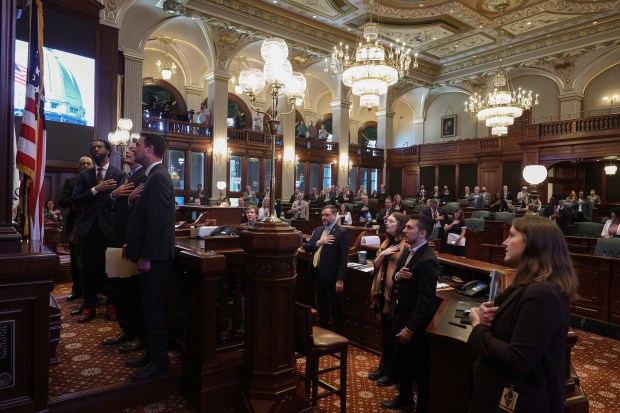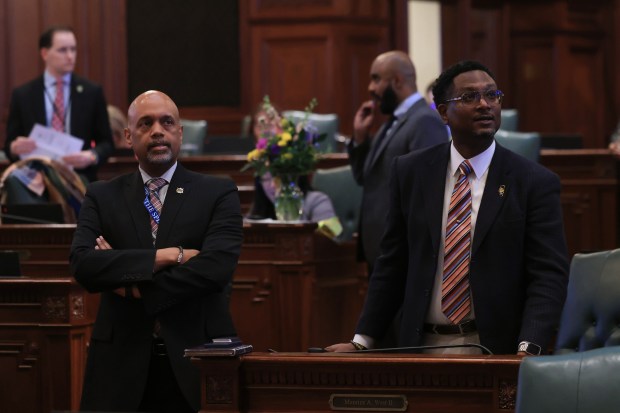SPRINGFIELD — With a little more than 24 hours remaining before their Saturday deadline, Democratic state lawmakers unveiled a $55 billion spending plan balanced with a combination of spending cuts and tax increases.
Heeding Gov. JB Pritzker’s warning that he would veto a plan that relied on increases to the state’s sales or income taxes, legislators produced a package that employed one-time tactics, such as an amnesty for delinquent tax filers, coupled with increased taxes on cigarettes, vaping and gambling, according to Sen. Elgie Sims, a Chicago Democrat and top budget negotiator.
“What we’re trying to do is make sure that this budget is balanced, and it is balanced, it is responsible, and it’s a statement of our priorities,” Sims said.
Sims didn’t go into specifics about the sin tax increases included in the plan. While the Democrats’ spending plan was unveiled Friday evening, hours later separate legislation including the revenue proposals had yet to be introduced.
The proposed spending package stuck closely to the broad outlines Pritzker presented to lawmakers in February. However, with revenue projections for the budget year that begins July 1 dimming in the months since the governor made his proposal, legislators also were considering some new ideas to bring in more money, including changes that would allow Illinois to tax offshore and out-of-state corporate profits.
Aside from wrangling over the state’s main operating budget, lawmakers continued to work on a plan to overhaul governance and increase funding for Chicago-area mass transit. It also remained to be seen whether there would be a late push for legislation to aid the Chicago Bears with the team’s proposed move to a new stadium in the northwest suburbs.
The legislative budget proposal, negotiated among the Democratic House and Senate leaders and the governor’s office, deviates from Pritzker’s original plan in certain areas, including funding for elementary and secondary education.
Pritzker proposed a $350 million increase as required under a 2017 school funding overhaul. But the measure introduced late Friday would boost funding by only $300 million over the current year, pausing a $50 million-per-year grant program designed to help school districts with high property tax rates and low real estate values.
“But it also includes the ability for us to have a study that talks about the efficacy of that program, making sure it is having the desired impact and reducing property taxes for hardworking homeowners across the state,” Sims said.
The proposal surfaced several hours after Pritzker met in his statehouse office with the legislature’s top Democratic leaders, House Speaker Emanuel “Chris” Welch of Hillside and Senate President Don Harmon of Oak Park. The trio emerged from the meeting expressing confidence they’d reach a deal before the calendar turns to June but offering no details.
Welch, whose House Democrats last year had to suspend chamber rules to round up the votes needed to pass a tax-hike package, said he didn’t anticipate similar issues this time.
“We’re getting close to a budget that I believe our caucus can support,” Welch said after the meeting.
It remains possible, however, that certain factions of the Democratic Party could dig in their heels over aspects of the proposed deal.
For example, the plan would make good on Pritzker’s recommendation to zero out funding for a state program that provides Medicaid-style health insurance for noncitizens ages 42 to 64. When Pritzker proposed the cut in February, his office estimated it would save the state about $330 million from its general fund.
The move, which would eliminate coverage for more than 30,000 residents, is unpopular among Latino lawmakers and progressives, but it was unclear whether they would withhold votes on the broader budget over the issue.
At the same time, some lawmakers are pushing to boost funding for hospitals that serve low-income patients and communities.
Sen. Lakesia Collins, a Democrat whose district includes a swath of Chicago’s West Side, said Mount Sinai Hospital in her district is facing financial troubles but she’s hopeful the hospital and others like it, collectively, will be able to get more than $160 million from the state budget to operate.
Collins also noted the uncertainty over how much federal health care funding Illinois will receive under President Donald Trump’s administration.
“Right now, as a state, we’re trying to figure out how do we maneuver around all of the challenges that we’re facing from the federal government while making sure that they’re sustainable here in Illinois,” Collins said.
It wasn’t immediately clear how much funding went to Mount Sinai and other safety-net hospitals, which typically treat the uninsured or Medicaid patients, often in low-income communities, but Sims suggested Friday evening the funding would be substantial.
“There are significant increases, investments in our hospital systems. Our safety-net hospitals are on the front lines,” said Sims. “They are caring for our most vulnerable. And we are making sure that we made investments in those safety-net hospitals because they carry a large volume of Medicaid clients. So, we want to make sure they have the resources necessary to be successful.”

With the clock running out on the legislature’s scheduled spring session, there also was a sense of urgency to address a looming $771 million fiscal cliff for the Chicago area’s mass transit system and to overhaul the system’s disjointed board structure.
Lawmakers, advocates and transit officials were working through competing House and Senate proposals Friday, with negotiations possibly moving away from a proposed increase on Chicago-area toll roads toward a new fee on deliveries. That came after labor groups and suburban officials criticized the proposed additional fee for tollway drivers.
Kirk Dillard, chair of the Regional Transportation Authority that oversees train and bus service across the city and suburbs, on Friday criticized the initial Senate plan to close the budget gap, saying in a statement that it would lead to “significant service cuts” next year.
Dillard suggested that less than half of the new revenue in Senate proposal would actually go toward funding transit operations, with the majority of the money going toward nonoperational and capital causes.
“While the bill also requires the regional entity to take on additional costs for new initiatives like a police force without dedicated funding, which could further limit available funding, our focus today is closing the budget gap to avoid service cuts in 2026,” Dillard said Friday.
Sen. Ram Villivalam, a Chicago Democrat, said Friday the Senate is committed to addressing transit funding and that lawmakers were working to address the pushback from critics.
“Our focus in the Senate is funding and reform. We always said, ‘No funding without reform,’” Villivalam said.
Late Friday, Republicans in the legislature’s superminority were trying to make sense of the 3,000-plus-page budget proposal.
While Rep. Norine Hammond, a Republican from Macomb, said she was “getting some little bits of information” on the overall plan, she was aware it contained 5% pay increases — to a base salary of $98,304 — for lawmakers. She said that if Democratic leaders are truly trying to be fiscally responsible, those raises shouldn’t be in the budget.
The plan includes similar increases for the governor, other statewide elected officials and the heads of state agencies. Pritzker, a billionaire Hyatt Hotels heir, does not take a state salary.
Hammond said she’s anxious to see what cuts were made by Democrats to close the budget hole.
“I would like to see the cuts that they have made. We have a billion-dollar, at least a billion-dollar deficit that we’re looking at. What cuts have you made?” Hammond said.
Tribune reporter Talia Soglin contributed.





